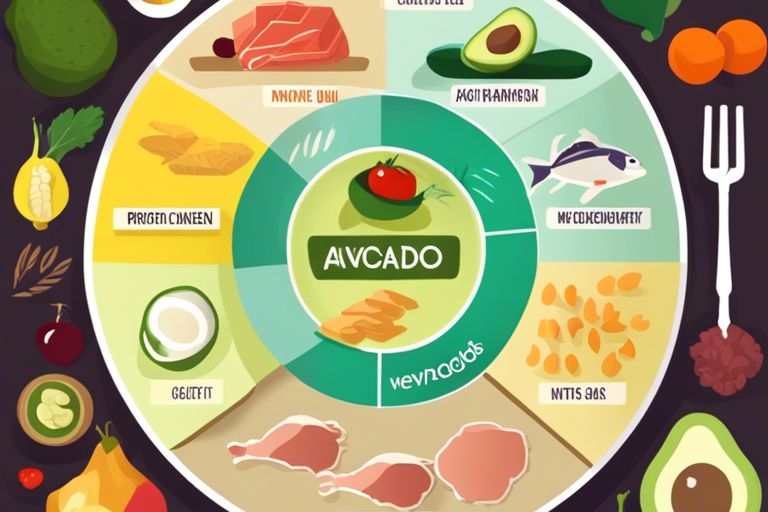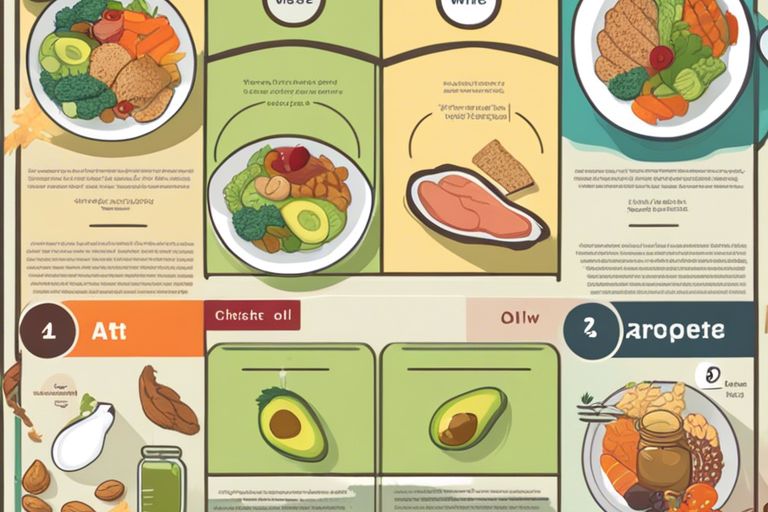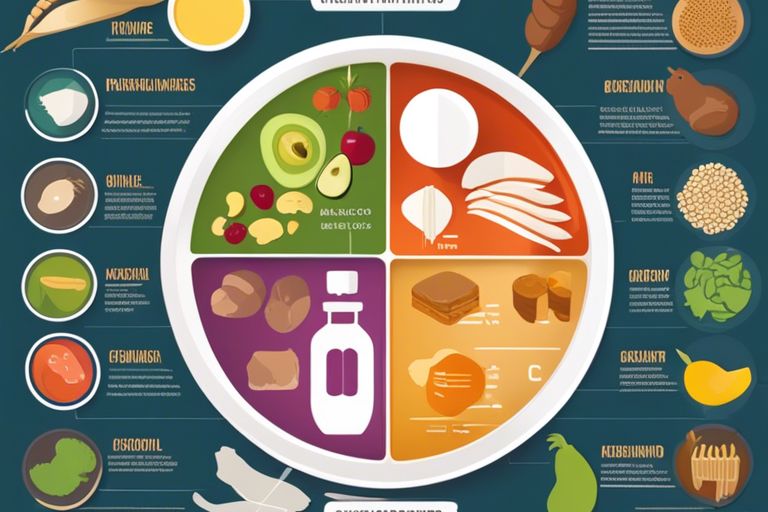Overwhelmed by the myriad of diet advice out there? Finding the right balance of proteins, fats, and carbohydrates is crucial for overall health and well-being. Understanding the role each of these macronutrients plays in the body can help you make informed choices about your diet. Proteins are essential for building and repairing tissues, while fats provide a concentrated source of energy. Carbohydrates are the body’s primary source of fuel, but not all carbs are created equal. Stay tuned for expert tips on how to strike the perfect balance for a healthier lifestyle.
Key Takeaways:
- Proteins: Ensure you include a variety of protein sources like lean meats, fish, legumes, and dairy products to support muscle growth and repair.
- Fats: Focus on incorporating healthy fats like those found in avocados, nuts, seeds, and olive oil to support brain function and overall health.
- Carbohydrates: Choose complex carbohydrates like whole grains, fruits, and vegetables which provide sustained energy and essential nutrients for optimal performance.

The Sublime Structure of Proteins
Clearly, proteins are one of the most fascinating molecules in the realm of biochemistry. Their intricate structures and diverse functions make them essential components of life.
The Building Blocks of Life
Sublime in their complexity, proteins are composed of long chains of amino acids. These amino acids are the building blocks that come together in various sequences to form unique proteins with specific functions.
These chains of amino acids fold into complex three-dimensional shapes, determining the protein’s function and interactions with other molecules in the body. The precise arrangement of amino acids in a protein is crucial for its stability and functionality.
The Role of Amino Acids in Health and Evolution
Evolution has fine-tuned the selection of amino acids in proteins over millions of years. Different organisms have adapted unique amino acid sequences to optimize their biological functions and survival in their respective environments.
For instance, mutations in the amino acid sequences of specific proteins can lead to genetic disorders or diseases. Understanding the role of amino acids in health and evolution provides valuable insights into the complexities of life and the mechanisms of evolution.
The Enigmatic Essence of Fats
While proteins and carbohydrates often take the spotlight in discussions about diet and nutrition, fats play an equally crucial role in maintaining overall health and well-being. Fats are often misunderstood and unjustly demonized, but in reality, they are essential for various bodily functions, including hormone production, insulation, and cell structure.
Unraveling the Types of Dietary Fats
When it comes to dietary fats, not all fats are created equal. It’s important to distinguish between saturated fats, unsaturated fats, and trans fats to make informed choices about the foods we consume. Saturated fats, commonly found in animal products and processed foods, have been linked to an increased risk of heart disease and other health concerns. In contrast, unsaturated fats, such as monounsaturated and polyunsaturated fats, can actually have positive effects on heart health when consumed in moderation.
- Saturated Fats: Found in animal products and processed foods
- Unsaturated Fats: Include monounsaturated and polyunsaturated fats
- Trans Fats: Artificially produced and linked to health risks
Assume that choosing the right fats can make a significant impact on your overall health and well-being. By incorporating more unsaturated fats from sources like nuts, seeds, and fish into your diet, you can reap the benefits of healthy fats and support your body’s essential functions.
Fats | Saturated Fats | Unsaturated Fats | Trans Fats
The Evolutionary Imperative of Essential Fatty Acids
Fats have been a critical component of our evolutionary history, playing a vital role in the development of the human brain and nervous system. Essential fatty acids, such as omega-3 and omega-6, are necessary for proper cognitive function, inflammation regulation, and overall cellular health. These fats cannot be produced by the body and must be obtained through diet, underscoring their importance in our daily nutritional intake.
The balance of omega-3 to omega-6 fatty acids is crucial for maintaining optimal health, as an imbalance can lead to chronic inflammation and related diseases. While omega-6 fats are abundant in many processed foods and vegetable oils, it’s essential to prioritize sources of omega-3 fats, such as fatty fish, flaxseeds, and walnuts, to support overall well-being.
Carbohydrates: The Fuel of the Stars
Keep your engines running and your body energized with the power of carbohydrates. Often overlooked in the world of nutrition, carbohydrates are the primary source of fuel for our bodies, providing the energy necessary to carry out our daily activities. But not all carbohydrates are created equal. Understanding the different types of carbohydrates and how they affect our bodies is key to maintaining a balanced diet.
Simple vs. Complex: A Molecular Perspective
Carbohydrates can be classified into two main categories: simple and complex. Simple carbohydrates, or sugars, are made up of one or two sugar molecules and are quickly digested by the body, providing a rapid source of energy. On the other hand, complex carbohydrates, such as starches and fiber, are made up of long chains of sugar molecules that take longer to break down, providing a more sustained release of energy.
The way in which carbohydrates are structured at the molecular level plays a significant role in how they impact our bodies. Simple carbohydrates can cause rapid spikes in blood sugar levels, leading to a crash in energy levels, while complex carbohydrates provide a more steady source of energy, helping to keep us feeling full and satisfied for longer periods of time.
The Integration of Carbs into the Human Journey
Human evolution has been closely intertwined with the consumption of carbohydrates. Our early ancestors relied on fruits, roots, and grains as essential sources of energy, fueling their activities and enabling them to thrive. As our diets evolved, so too did the way in which we obtained and processed carbohydrates, leading to the wide variety of carbohydrate-rich foods available to us today.
The consumption of carbohydrates has played a crucial role in shaping human societies and civilizations, providing the energy needed to fuel innovation, exploration, and progress. While the excessive consumption of processed carbohydrates can have negative effects on our health, when consumed in moderation as part of a balanced diet, carbohydrates play a vital role in supporting our overall well-being and energy levels.
Architecting Your Diet: Practical Strategies for Balance
Despite the abundance of dietary information available today, many people still struggle to strike the right balance of proteins, fats, and carbohydrates in their diets. Achieving harmony in your nutritional intake requires a thoughtful approach and a solid understanding of your body’s unique needs. In this chapter, we will investigate into practical strategies for architecting a well-balanced diet that fuels your body and mind effectively.
Decoding Nutritional Needs with Science
With the advancements in nutritional science, we now have a clearer picture of how proteins, fats, and carbohydrates function in the body. Proteins are essential for building and repairing tissues, fats are crucial for hormone production and nutrient absorption, while carbohydrates provide energy for daily activities. Understanding the roles of these macronutrients can help you make informed decisions about your dietary choices and create a balanced meal plan.
Nutritional needs vary from person to person based on factors such as age, gender, activity level, and overall health. It’s essential to listen to your body and pay attention to how different foods make you feel. By tuning into your body’s signals, you can pinpoint any deficiencies or imbalances in your diet and make necessary adjustments to optimize your nutrient intake.
Challenging the Dogma: Personalizing Your Nutrient Intake
The one-size-fits-all approach to nutrition is becoming obsolete as more research highlights the importance of personalized dietary recommendations. While general guidelines can serve as a starting point, tailoring your nutrient intake to suit your individual needs is key to achieving optimal health and well-being. Experimenting with different macronutrient ratios and observing how your body responds can help you fine-tune your diet for maximum benefits.

To wrap up
Hence, achieving a balanced diet that includes proteins, fats, and carbohydrates is crucial for maintaining a healthy lifestyle. By understanding the role that each of these macronutrients plays in our bodies, we can make informed choices about the food we consume. Note, moderation and variety are key when it comes to nourishing our bodies and fueling our daily activities. So, next time you sit down for a meal, make sure to include a mix of proteins, fats, and carbohydrates to keep your energy levels stable and your body functioning at its best.
FAQ
Q: Why is it important to balance proteins, fats, and carbohydrates in your diet?
A: Balancing proteins, fats, and carbohydrates in your diet is essential for maintaining overall health and well-being. Proteins are necessary for building and repairing tissues, fats provide energy and support cell growth, while carbohydrates are the body’s main source of energy. A balanced diet ensures that you are getting the nutrients you need to function optimally.
Q: How can I determine the right balance of proteins, fats, and carbohydrates for my diet?
A: The ideal balance of proteins, fats, and carbohydrates in your diet depends on various factors such as your age, gender, activity level, and overall health goals. A general guideline is to aim for a diet consisting of about 20-35% of calories from fats, 10-35% from proteins, and 45-65% from carbohydrates. It is best to consult with a nutritionist or healthcare provider to determine the most suitable balance for your individual needs.
Q: What are some examples of healthy sources of proteins, fats, and carbohydrates?
A: Healthy sources of proteins include lean meats, poultry, fish, eggs, dairy products, legumes, and nuts. Good sources of healthy fats are avocados, olive oil, nuts, seeds, and fatty fish like salmon. Whole grains, fruits, vegetables, and legumes are excellent sources of carbohydrates. Consuming a variety of these foods can help you achieve a well-rounded and balanced diet.

